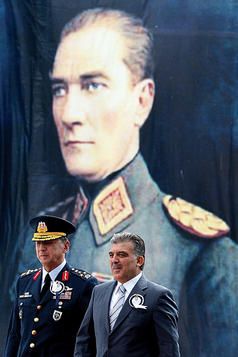
Turkish President Abdullah Gul (r.) stands by a military officer in front of an image of Mustafa Kemal Ataturk – Photo Credit: Newscom
Last month Steven Cook of the Council on Foreign Relations published an excellent summary of the ongoing investigations in Turkey and how they continue to roil the politics of that country. “The Weakening of Turkey’s Military” is available here. Those interested in the topic should also take a look at Soli Ozel’s blog at World Affairs; the post titled “The Unraveling” is provocative and insightful. I am not going to repeat their analyses here but anyone interested in the important role of Turkey in the Middle East, Europe and the tension between Islamic and secular politics should make sure to read what Cook and Ozel are publishing and posting (as well as Soner Cagaptay of the Washington Institute for Near East Policy).
The basic thrust of Cook’s issue brief is that the Turkish military is not nearly as strong a force as is often assumed. Toward the end of the brief Cook drops in a paragraph that has implications for how we should think about interventionist militaries in any country. The heading of the paragraph is a counter-intuitive eye catcher: “The Inherent Weakness of Coups.”
The phrase that jumps out of that paragraph is “coercion is the least efficient means of political control.” This is not wishful thinking but an analytical position of great policy import – and coercion in this case is not limited to military coups. Cook himself noted much the same about Hosni Mubarak’s regime in Egypt in a piece he wrote last year for Middle East Strategy at Harvard. Cook says he is “channeling Gramsci” and indeed he is drawing on Gramsci’s work on the role of ‘political society’ in domination and hegemony. Tomes have been written about it and no need to rehash here. But there is still a standard reflex in policymaking circles that assumes that coercion, or the potential to coerce, is a sign of a political actor’s strength. Yet just the opposite could be the case. I am not suggesting that the NSC start holding brown bag seminars on Gramsci, but taking Cook’s point seriously should be taken into account in assessing the strength of interventionist militaries (and others). Who – and how – the US engages those actors hangs in the balance.